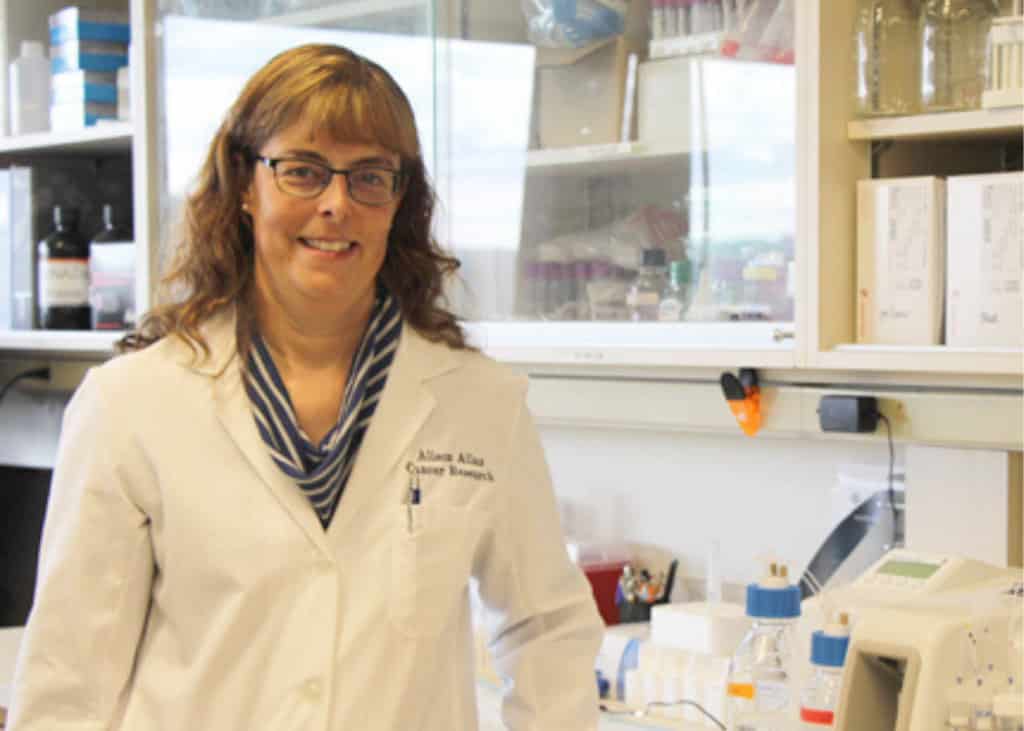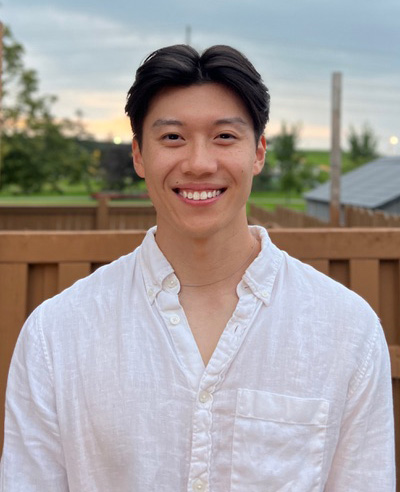Our Meet the Researcher Series will introduce you to a researcher we support through the Studentship Program in the Breast Cancer Society of Canada, Translation Breast Cancer Research Unit, (TBCRU) London Health Sciences Centre. This monthly series will provide updates on the life-saving breast cancer research projects BCSC funds in the TBCRU.
First in the series is Dr. Alison Allan, a Senior Oncology Scientist and the Director of the Breast Cancer Society of Canada’s TBCRU at @lhsccanada.
Please tell us a little bit about yourself.
My name is Dr. Alison Allan, and I am a Senior Oncology Scientist and the Director of the Breast Cancer Society of Canada Translational Research Unit at the London Health Sciences Centre. I hold a BSc in Molecular Biology and Genetics and a PhD in Biomedical Science, both from the University of Guelph.
Why is the TBCRU Studentship Program important to you, and how does it advance your research?
The TBCRU Studentship Program is an amazing program aimed at training the next generation of breast cancer researchers in Canada. It allows us to recruit and retain the best and brightest students and postdoctoral/clinical fellows to carry out cutting-edge research focused on the understanding, prevention, tracking and/or treatment of metastatic breast cancer, the deadliest aspect of breast cancer. Without this program and the support of the BCSC, my research simply wouldn’t be possible!
What is the objective of your research project and what problem(s) you hope to solve?
My research is aimed at understanding how and why breast cancer metastasizes (spreads) to the lung, and how we can stop this from happening using new treatment approaches.
In a few lines, please describe your research project.
Lung metastasis happens more frequently in breast cancer patients with triple negative disease, and thus our studies are mainly focused on this subtype. With the help of current and past BCSC-funded students, our research has shown that particles known as extracellular vesicles (EVs) can be released from a primary triple negative tumor and travel in the blood to the lung, where the EVs then signal the lung to develop a more supportive environment for additional breast cancer metastatic growth. We are now in the process of using pre-clinical animal models to determine if specific drugs can cut off this communication between the breast tumor and the lung.
Have there been any changes to or any advancements in your research since your project began?
Yes, we have some recent promising results through the use of an FDA-approved drug. We have observed that this drug is able to prevent the communication between the breast cancer primary tumor and the lung in mouse models of triple negative breast cancer, thereby reducing the occurrence of lung metastasis.
Have you had an opportunity to present (or publish) your research to your peers or the broader research community? Was it at a national or international meeting or in some other way?
Unfortunately due to the ongoing pandemic, we have had not had the opportunity to present this most recent research. However, we are just in the process of preparing a journal publication for submission to share with the scientific community and hope that this will be published later in 2022.
If you received feedback following your presentation how has it helped you and your research?
Feedback on scientific presentations and publications is always extremely valuable, as it helps provide new viewpoints that we might not have considered and allows us fine-tune our research methods and approaches. Hopefully we will be able to travel to national and international conferences again soon, since this is critically important for scientific knowledge-sharing and research advancement.
How will your research be applied in the clinic or in a real-world setting? How will patients benefit from the results of your work?
After we have completed our pre-clinical studies, we hope to move to early-stage clinical trials in breast cancer patients in the future, with the ultimate goal of applying our new therapeutic approaches to reduce or even prevent lung metastasis.
Tell us about your involvement in the Breast Cancer Society of Canada fundraising events (Dress for the Cause, Mother’s Day Walk).
I love participating in the BCSC fundraising events each year, including Dress for the Cause and the Mother’s Day Walk/One Billion Steps Challenge as Team Captain. Last year (2021), our fantastic team of trainees and scientists collectively took more than 2.8 million steps in the month of May and raised lots of funds for BCSC!
What are your hobbies? What are you currently reading, watching or listening to outside of the lab?
When I am not in the lab, I enjoy playing tennis, skiing, cooking, and reading. I am currently reading the biography of former Olympic hurdler Perdita Felicien (“My Mother’s Daughter”) and watching “The Marvelous Mrs. Maisel” streaming on Prime.




